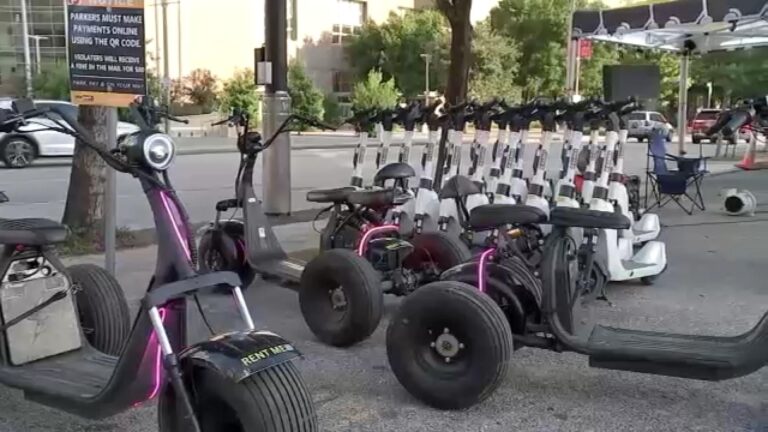Debate Intensifies Over Electric Scooter Ban in Downtown Houston
Downtown Houston finds itself at the heart of a contentious discussion as municipal leaders deliberate the possibility of prohibiting electric scooters. The community’s response is divided, with residents and local business proprietors expressing varied opinions on safety, accessibility, and economic consequences. As FOX 26 Houston delves deeper, the diverse perspectives reveal the multifaceted challenges of integrating e-scooters into the city’s vibrant urban landscape.
Safety and Accessibility: Concerns Raised by Downtown Residents
Safety issues have emerged as a primary concern among downtown inhabitants amid the growing debate over e-scooter regulations. Numerous residents recount close calls and accidents involving scooters navigating sidewalks and pedestrian crossings, advocating for enhanced safety measures rather than an outright ban. Parents, in particular, highlight the risks posed to children, with one local commenting, “The unpredictable speed and movement of scooters create real dangers for pedestrians, especially in crowded zones.”
Accessibility remains a divisive topic. Proponents argue that e-scooters provide essential last-mile transit options, easing traffic congestion and improving mobility. Conversely, critics point to scooters obstructing narrow sidewalks and blocking critical access points, complicating movement for individuals using strollers or wheelchairs. The recent community forum summarized these viewpoints as follows:
| Issue | Proponents’ Perspective | Opponents’ Perspective |
|---|---|---|
| Pedestrian Safety | Advocate for dedicated scooter lanes and increased rider awareness | View scooters as unpredictable hazards on sidewalks |
| Accessibility | Crucial for convenient access to downtown amenities | Cause obstructions, limiting mobility for vulnerable pedestrians |
| Environmental Impact | Considered a green alternative to car travel | Concerns about battery disposal and environmental waste |
Economic Implications: Business Owners Speak Out Against a Potential Ban
Entrepreneurs and business leaders in downtown Houston have expressed apprehension about the financial fallout that could result from banning e-scooters. Many establishments depend heavily on the steady stream of customers who use scooters to reach shops, eateries, and entertainment venues. The removal of this convenient transportation option could lead to diminished foot traffic, adversely affecting sales and employment.
Key worries voiced by business owners include:
- Reduced ease of access for both tourists and local patrons navigating downtown.
- Lower incidence of spontaneous purchases due to decreased pedestrian presence.
- Commuting difficulties for employees reliant on scooters for timely travel.
| Business Sector | Observed Impact | Owner’s Concern |
|---|---|---|
| Restaurants & Cafés | Approximately 30% drop in lunchtime customers | Loss of quick and convenient access for patrons |
| Retail Outlets | 25% decrease in weekend footfall | Fewer impulse buys and reduced visibility |
| Entertainment Spots | 15% decline in event attendance | Challenges in attracting younger demographics |
City Authorities Review Data and Community Input on E-Scooter Usage
Houston’s city officials are carefully analyzing empirical data alongside public feedback to inform their decisions regarding e-scooter policies downtown. Transportation reports indicate a steady rise in scooter usage, with peak activity coinciding with public transit rush hours. Officials have also tracked issues such as sidewalk congestion, safety incidents, and pedestrian complaints to weigh the pros and cons of potential restrictions.
Community engagement efforts, including surveys and town hall meetings, reveal a spectrum of opinions:
- Supporters highlight improved urban mobility and reduced car traffic.
- Detractors raise concerns about noise, blocked pathways, and safety risks.
- Business stakeholders worry about the impact on customer flow and storefront exposure.
| Metric | Current Figures | Community Feedback |
|---|---|---|
| Average Daily Scooter Trips | 8,500 | Mixed Reactions |
| Monthly Reported Accidents | 12 | High Concern |
| Complaints Logged | 154 | Moderate Concern |
Strategies for Harmonizing Urban Mobility and Public Safety in Houston
Achieving a sustainable balance between efficient urban transportation and pedestrian safety demands cooperation among city planners, residents, and business owners. The following strategies are recommended:
- Establishing dedicated e-scooter lanes and parking zones: To reduce sidewalk clutter and enhance pedestrian safety.
- Strengthening enforcement of safety protocols: Including mandatory helmet use, speed limits, and stricter penalties for violations.
- Launching educational campaigns: Raising awareness among riders and pedestrians about responsible scooter use and shared space etiquette.
- Facilitating ongoing stakeholder engagement: Regular forums for dialogue among community members, businesses, and city officials to address concerns and refine policies.
Insights from pilot programs in similar metropolitan areas suggest the following potential benefits:
| Initiative | Projected Benefit | Implementation Timeline |
|---|---|---|
| Dedicated Scooter Lanes | 30% reduction in pedestrian accidents | 6 months |
| Helmet Law Enforcement | Helmet usage increased to 75% | 3 months |
| Public Awareness Initiatives | 40% improvement in community acceptance | 4 months |
| Stakeholder Forums | Enhanced responsiveness in policymaking | Ongoing |
Looking Ahead: Navigating the Future of E-Scooters in Houston
As Houston’s leadership continues to assess the role of electric scooters in the downtown area, opinions among residents and business owners remain polarized. While safety and pedestrian concerns are paramount for some, others emphasize the convenience and economic vitality scooters contribute. This ongoing conversation highlights the intricate task of balancing technological innovation with community well-being. FOX 26 Houston remains committed to tracking developments and amplifying local voices on this pivotal urban mobility issue.




